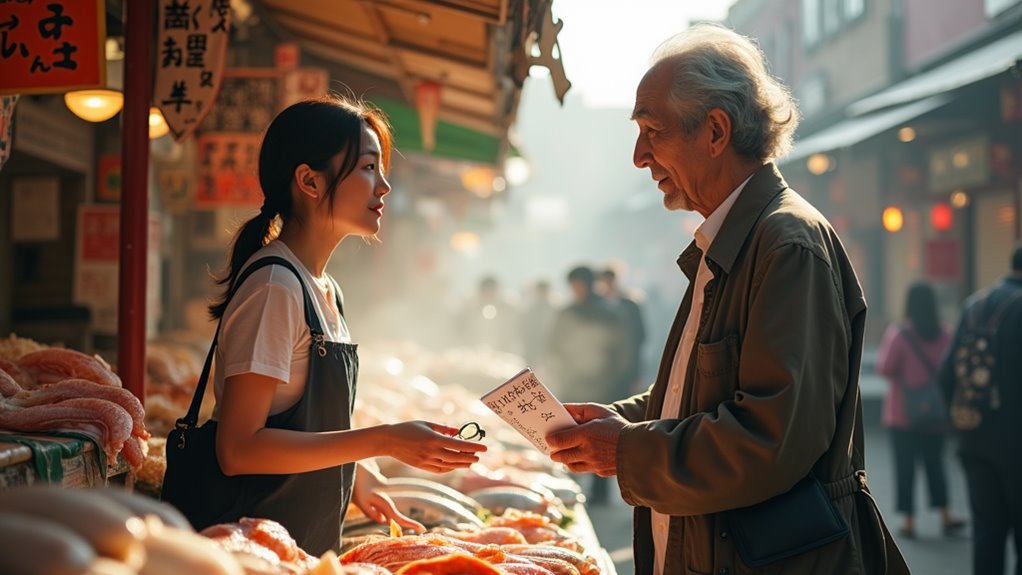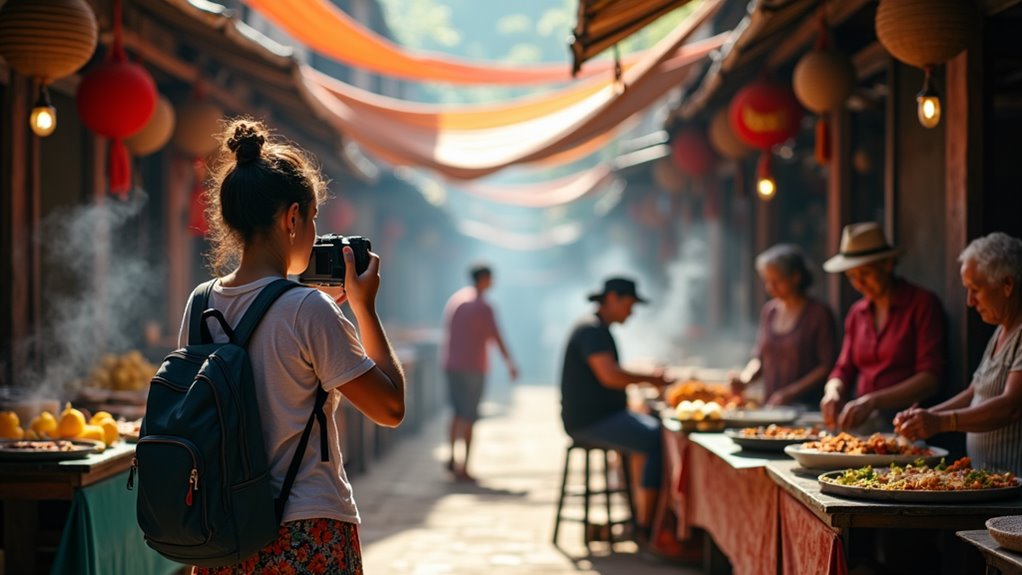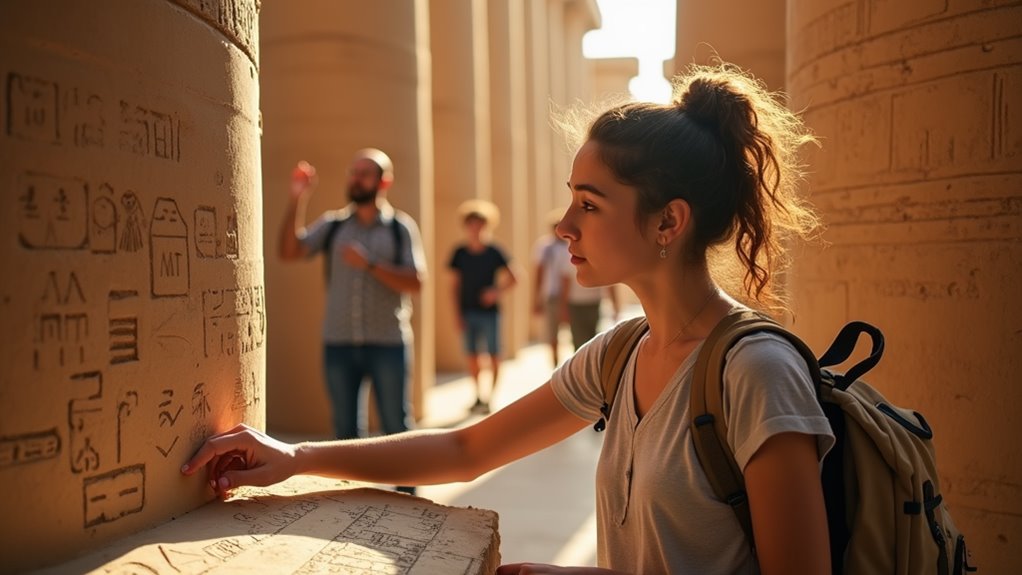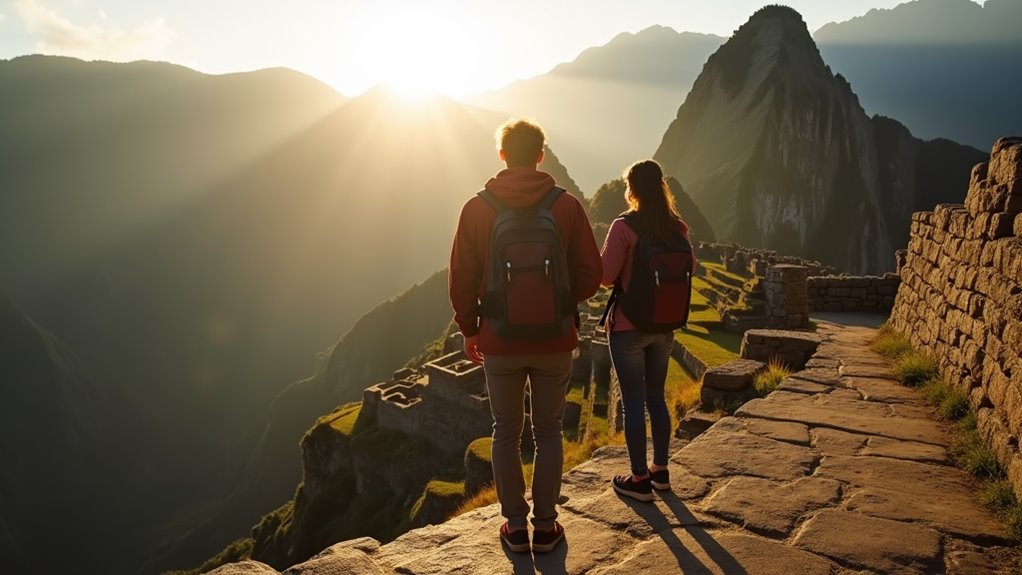When you travel as an active learner, you'll gain education that no classroom can match. Through cultural immersion, you'll engage with locals, learn new languages organically, and develop cross-cultural communication skills. You'll discover diverse perspectives by participating in community activities, trying traditional practices, and exploring historical sites firsthand. Travel strengthens your professional profile while building adaptability, problem-solving abilities, and global awareness. You'll boost your confidence, enhance emotional intelligence, and develop lasting connections with different cultures. These transformative experiences mark just the beginning of your educational journey through mindful travel.
Key Takeaways
- Direct cultural immersion through local interactions provides deeper learning experiences than traditional classroom education about different societies.
- Travel develops practical problem-solving skills and adaptability by confronting real-world challenges in unfamiliar environments.
- Engaging with native speakers in authentic settings accelerates language acquisition more effectively than formal language instruction.
- Historical sites and cultural landmarks offer tangible connections to past events, making history education more memorable and meaningful.
- Exposure to diverse perspectives and customs naturally cultivates critical thinking and challenges existing worldviews.
Cultural Immersion and Learning Strategies

While many travelers focus solely on visiting tourist attractions, true cultural immersion requires deliberate learning strategies. You'll gain deeper insights by engaging with locals, learning basic phrases in their language, and participating in daily community activities.
Consider staying with host families or in local neighborhoods rather than tourist districts. Make an effort to observe and practice local customs, from dining etiquette to social gestures.
You can enhance your learning by keeping a travel journal, documenting your observations, and reflecting on cultural differences.
Don't shy away from local markets, community events, or traditional ceremonies. When you encounter unfamiliar situations, ask respectful questions and remain open to new perspectives.
Beyond the Tourist Bubble
You'll discover authentic local experiences by stepping away from popular tourist attractions and into neighborhoods where residents live, work, and socialize.
Rather than merely observing from a distance, you can engage in genuine cultural exchanges through homestays, community events, or local markets.
Exploring lesser-known areas opens up spontaneous learning opportunities, from understanding daily routines to participating in traditional practices that tourist packages rarely include.
Local Life and Customs
To truly understand a destination, stepping beyond typical tourist attractions and immersing yourself in local life offers the richest educational experience.
You'll discover authentic cultural practices, daily routines, and social customs that textbooks can't convey. Visit local markets, observe family dynamics, and participate in community gatherings to gain genuine insights.
Learn to navigate public transportation like residents do, shop at neighborhood stores, and try regional dishes in family-run establishments.
Don't hesitate to strike up conversations with locals about their traditions, beliefs, and perspectives.
You'll find that morning coffee rituals, evening social gatherings, and weekend activities reveal more about a culture than any guided tour.
These firsthand experiences will transform your understanding of different societies and challenge your preconceptions about how others live.
Cultural Exchange Vs Tourism
Although tourism and cultural exchange may seem similar, they differ fundamentally in their approach and impact.
While tourism often involves observing from a distance and following predetermined paths, cultural exchange requires active participation and genuine interaction with local communities.
You'll find that true cultural exchange happens when you step outside your comfort zone to engage meaningfully with locals.
Instead of just photographing traditional ceremonies, participate in them. Rather than eating at tourist restaurants, learn to cook local dishes in someone's home.
Skip the guided tours and spend time in neighborhood markets, local festivals, or community gatherings.
The key is to move beyond being a passive observer and become an active learner, allowing yourself to be transformed by authentic experiences and connections.
Off-Path Learning Opportunities
Real learning begins when you venture beyond the well-worn tourist paths into authentic local experiences.
You'll find unexpected teachers in local markets, family-run workshops, and community gatherings. These spontaneous encounters often provide deeper insights than guided tours ever could.
Take time to explore neighborhood parks, join a cooking class in someone's home, or attend a local festival.
You'll discover how people really live, work, and celebrate in their communities.
Try visiting during off-peak seasons when locals aren't overwhelmed by tourist crowds.
Strike up conversations with shopkeepers, farmers, or artisans who'll share their expertise and stories.
Remember that some of the most valuable learning happens when you're willing to get lost, make mistakes, and embrace the unknown.
Language Acquisition Through Travel

You'll discover that learning a language through travel offers unique advantages over traditional classroom instruction, as you're forced to engage in real-time conversations with native speakers.
Through natural exchanges at markets, restaurants, and public spaces, you'll quickly build practical vocabulary and improve pronunciation in ways textbooks can't replicate.
Cultural immersion methods, such as staying with local families or joining community activities, will accelerate your language development by connecting words and phrases to authentic experiences.
Natural Language Exchange
How can travelers best absorb a new language during their journeys abroad? One of the most effective approaches is engaging in natural language exchanges with locals in everyday situations.
You'll find authentic learning opportunities at markets, cafes, and community gatherings where conversation flows organically. Start with simple interactions like ordering food, asking for directions, or discussing the weather.
These real-world exchanges help you grasp contextual meanings and cultural nuances that textbooks can't teach. Don't worry about making mistakes; locals often appreciate your effort to speak their language and will help you improve.
Keep a small notebook to jot down new phrases you hear, and try using them in your next conversation. This practical approach builds confidence and accelerates your language learning journey.
Cultural Immersion Methods
While language exchanges provide valuable practice, true cultural immersion demands a deeper level of engagement.
You'll need to venture beyond tourist areas and engage with locals in their daily routines. Shop at neighborhood markets, attend community events, and participate in local traditions to understand cultural contexts.
Consider staying with a host family or in residential areas rather than hotels. This exposure helps you grasp cultural nuances, social norms, and nonverbal communication that you can't learn from textbooks.
Join cooking classes, craft workshops, or community sports teams to connect with people who share your interests.
Document your experiences through journaling or audio recordings. This reflection process helps solidify your cultural understanding and language skills while creating meaningful connections that transform your travel into genuine educational experiences.
Adapting to New Environments
As travelers venture into unfamiliar territories, they face the immediate challenge of adjusting to new surroundings. You'll need to acclimate to different time zones, climates, and daily rhythms while maintaining your physical and mental well-being.
Start by establishing a routine that helps you stay grounded. You can adapt more easily by following local eating schedules, adjusting your sleep patterns gradually, and staying hydrated.
Don't hesitate to give yourself time to process the changes – it's perfectly normal to feel overwhelmed at first.
Make an effort to understand local customs and social norms. You'll find that observing how locals navigate their environment provides valuable insights.
Remember that flexibility is key – what works at home may not work in your new setting.
Global Perspectives in Education

Travel expands your educational horizons by exposing you to diverse worldviews and cultural perspectives.
When you immerse yourself in different societies, you'll discover how education systems vary globally, from Finland's student-centered approach to Japan's emphasis on collective responsibility.
You'll learn that knowledge isn't limited to classroom walls. Street markets in Morocco teach economics, while ancient ruins in Greece bring history to life.
These experiences help you understand that learning styles and educational values differ across cultures. Some societies prioritize practical skills, while others focus on theoretical knowledge.
Travel as Professional Development
Beyond cultural insights, exploring new destinations can transform your career trajectory. When you travel, you'll develop adaptability, problem-solving skills, and cross-cultural communication abilities that employers value. You'll learn to navigate unfamiliar situations, manage unexpected challenges, and work effectively with people from diverse backgrounds.
Travel experiences can enhance your resume by demonstrating global awareness and flexibility. You'll gain industry-specific knowledge by visiting international businesses, attending conferences abroad, or participating in professional exchange programs.
These experiences often lead to valuable networking opportunities and potential collaborations across borders. Whether you're studying local business practices or observing innovative approaches in your field, travel provides hands-on learning that traditional professional development can't match.
Historical Sites as Living Classrooms

When you step onto the grounds of historical landmarks, you're entering more than just ancient structures – you're walking into immersive learning environments. These sites transform abstract textbook knowledge into tangible experiences, allowing you to witness history firsthand.
At places like Gettysburg or Pompeii, you'll find yourself absorbing information through multiple senses. You can touch the weathered stones, hear the echoes of the past through expert guides, and visualize historical events in their actual settings.
Archaeological sites reveal layers of civilization, while preserved buildings showcase period-specific architecture and daily life. Interactive exhibits and reconstructions help you understand the context of historical events, making complex historical narratives easier to grasp and remember.
Mindful Travel for Personal Growth
Every mindful journey presents an opportunity for profound self-discovery and personal transformation. When you travel with intention, you'll discover aspects of yourself that remain hidden in familiar surroundings.
You'll develop resilience by navigating unfamiliar situations and learn to embrace uncertainty as a catalyst for growth.
Practice mindful travel by engaging fully with your surroundings. Observe local customs without judgment, interact meaningfully with residents, and challenge your preconceptions.
Step outside your comfort zone by trying new foods, speaking different languages, and participating in cultural traditions. Keep a travel journal to reflect on your experiences and document your evolving perspectives.
You'll find that mindful travel doesn't just expand your worldview – it cultivates empathy, adaptability, and self-awareness, making you a more well-rounded person with each thoughtful adventure.
Frequently Asked Questions
What Travel Insurance Covers Educational Programs and Cultural Immersion Experiences?
You'll find specialized study abroad insurance policies and comprehensive travel insurance plans that cover educational programs and cultural immersion experiences.
Look for plans offering coverage for tuition reimbursement, program interruption, and cultural property damage.
Companies like World Nomads, GeoBlue, and iNext offer specific plans for students and cultural travelers, including emergency evacuation, medical care, and trip cancellation protection related to educational activities.
How Do You Balance Social Media Documentation With Genuine Travel Experiences?
Like a butterfly that's too busy posing for photos to taste the flower's nectar, you'll miss life's sweetest moments if you're consumed by social media.
Set specific times for posting and documenting, perhaps morning or evening, and keep your phone tucked away during experiences.
When you do share, focus on meaningful stories rather than constant updates.
You'll find deeper connections to both places and people when you're fully present.
Which Destinations Offer the Best Value for Educational Travel Experiences?
You'll find exceptional educational value in Southeast Asian countries like Vietnam and Thailand, where rich history meets affordable living costs.
Eastern European destinations like Poland and Hungary offer deep cultural immersion and historical significance at reasonable prices.
Mexico's archaeological sites and colonial cities provide strong educational experiences, while Greece combines ancient history with moderate costs, especially during shoulder season.
Are There Age Restrictions for Educational Travel Programs Worldwide?
Like Alice stepping through the looking glass, you'll find educational travel programs for every age group.
Most study abroad programs require you to be at least 13-18 for high school exchanges, while college programs typically need you to be 18+.
Youth programs often accept kids as young as 10, and there's no upper age limit for adult learning tours.
You'll just need to meet each program's specific health and mobility requirements.
What Medical Preparations Are Necessary for Long-Term Educational Travel?
Before embarking on long-term educational travel, you'll need several medical preparations.
Start by getting a comprehensive check-up and required vaccinations for your destinations. You should obtain necessary prescriptions for the entire duration, carry medical records, secure travel insurance with health coverage, and pack a basic first-aid kit.
Don't forget to research local healthcare facilities and keep emergency contacts handy.
Conclusion
You're standing at the crossroads of adventure and wisdom, where each step forward unveils a new lesson. As you pack your bags for your next journey, remember that the world's classroom doesn't have walls – it has horizons. The knowledge you'll gain won't come from textbooks but from the stories written in ancient stones, foreign tongues, and the eyes of those you'll meet along the way.

Leave a Reply